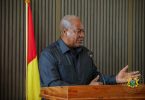The Colleges of Education Teachers Association of Ghana (CETAG) has announced its intention to engage in a crucial meeting with the National Labour Commission (NLC) on Wednesday, August 16, in an effort to bring an end to the ongoing strike that has gripped the nation’s 46 training colleges for the past two weeks. The move comes after the failure of negotiations between CETAG and the government, prompting the organization’s members to embark on the strike action since August 1.
The strike was called in response to the government’s alleged non-compliance with the Arbitral Award Orders issued by the NLC and the failure to honor negotiated conditions of service. The NLC had made these awards and directives on May 2, 2023, but CETAG claims that the government has not taken the necessary steps to implement them, leading to a state of discontent among its members.
Despite CETAG’s persistent efforts, including the sending of multiple notices to the Ministry of Finance, the agreed-upon negotiations have remained unimplemented, culminating in the decision to undertake strike action. The situation has undoubtedly affected the normal functioning of the 46 training colleges across the country, impacting both the education system and the students’ academic pursuits.
President of CETAG, Prince Obeng Himah, expressed the organization’s readiness to attend the upcoming meeting with an open mind. He emphasized CETAG’s consistency in its stance from the very beginning of this standoff and reiterated the importance of the NLC’s role in enforcing its own laws or compelling the government to adhere to the directives set forth.
“We do not want to go in with preconceived notions. But we are clear, that will be our expectation going into that meeting,” President Himah conveyed in an interview with Citi News. This statement underscores CETAG’s hope for a resolution that considers the welfare and rights of its members and ultimately benefits the broader educational landscape of Ghana.
The impending meeting between CETAG and the NLC carries significant implications, not only for the immediate resolution of the strike but also for the relationships between educators and the government moving forward. As both parties prepare to engage in constructive dialogue, many will be watching closely to see whether this crucial meeting will lead to a breakthrough or prolong the impasse that has disrupted the nation’s educational sector.
While the fate of the strike remains uncertain, the willingness of CETAG’s leadership to engage in discussions reflects their commitment to finding a solution that honors the rights of teachers and acknowledges the importance of a well-functioning education system in Ghana. As Wednesday, August 16 approaches, the anticipation for a positive outcome remains high, both within the education sector and among the general public.







